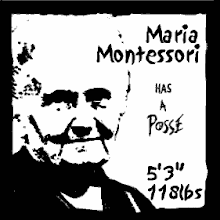It wasn't until I worked as a receptionist that I first read
Newsweek magazine. In an incredibly slow office, magazine selection becomes very important. I had both Time and Newsweek to select from, but inevitably, I found time to be an inferior product. Why? Because it lacked the ADD-inspired features that Newsweek seemed to tailor to my generation.
So, when I think of the phrase "conventional wisdom" what comes to mind is that little graphic organizer they in the front of the magazine charting the impact of specific news events using an arrow that goes up, down or left to right.
Moving up a level in complexity, I realize that I am old enough and educated enough to have developed my own conventional wisdom. What's worse, rekindling my appreciation for Montessori pedaegogy is challenging all of the conventional wisdom I have picked up from my exposure to the education reformers out there.
Here's the old wisdom:
What we need right now are smaller class sizes. Then teachers can give individualized attention and teach to the multiple intelligences. So, we need money for more teacher. But, better prepared teachers, too. Oh, and equity. Equal pay, regardless of city or suburb or rural location. So, ummm, uh, we need small classes and we also need to abolish property-tax funding structures. Oh, my god, that's, like, so fucking much to do. Where can we start...Shit, but you know, we CAN start. YEAH. We can make these changes. Little by little. Small victories.
That is the kind of frenzy that reformers have to work up in order to face the excrutiating pace of beauracratic change. It requires a lot of mental and intellectual energy to fight the battles over those issues. Folks make a career out of it. Studying educational policy always seemed like a plausible career for myself because it doesn't seem so difficult to collect data and analyse it. Especially when you feel like it is making a difference. You start putting heart and soul into the nuance of the issue in which you are an expert. You love the issue. You care about it. The issue is your child, and your child must succeed. Even at the expense of the bigger picture. Because how can you look at the wide expanse of "education issues" and see past the precious being that you nuture?
That's the question that is erroding away my conventional wisdom. Whether you love standardized testing or project-based learning, once you get excited by your research or your process in appoaching schooling, it's so hard to see another way that will work.
Spending time in public schools, I just don't see the smaller class size REALLY making a meaningful change. There's too much else broken. Equitable funding would be a great step forward for democracy, but what kind of system would this equity fund. Our education system today is built on some nasty old business and industry model.
Ross Periot said, regarding schools in Texas, "We've got to nuke this educational system." Of course a business man is going to use a violent metaphor and have no fucking clue about educating for democracy, but his instinct to renew is right on.
All the Montessori in my brain says we've got to stop the grade level madness. Kids don't develop on little shelves in a supermarket, we've got to let them grow at their own pace. Montessori schools allow for that. Montessori provides a work environment MORE like modern business practices because you are accountable for your own learning (in a gentle way, of course). What are we waiting for? Why can't we imagine this as what is possible? What we want for children?
So, my new CW seems to want to conventionalize the idea that Montessori is just the superior method of educating the very young, no matter what. I'm sure I'll grow to embrace a more nuanced picture, but it will take some time.
For now, on with the broad stair.
Labels: academia, education reform

